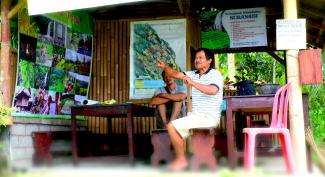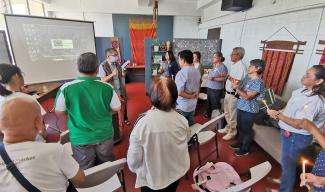Bali's Subak as Community Based Ecotourism
Posting Date
Suweden never imagined that his initiative would bring fruit. In spite of, at the beginning, his only wish being to protect their traditions and find balance in life, he and the community of Jatiluwih won the “ASEAN Homestay Award 2017†at the ASEAN Tourism Forum (ATF).
I Gede Suweden, (his full name), and his community at Jatiluwih, started their ecowisata group in 2015, naming it Suranadi. The subak was the main attraction for tourism in Jatiluwih, and Suranadi is the name of one of the water springs that feed into their village subak.
Ecowisata is the inside/middle road chosen by Suweden and his community. The pressure of the tourism industry had long been eroding the farmers' lands. Total reliance upon farming often did not fulfill even basic needs for survival. Add to this, when land becomes commercial it incurs increased taxes, anything up to 7 million per strip, per year, especially those fields situated in places considered to be strategic locations from the perspective of the tourism industry.
With additional income from ecotourism, the families of Jatiluwih found they could still protect their subak traditions without subscribing to mass tourism. Subak is based upon the Tri Hita Kirana philosophy, which emphasizes the importance of maintaining balance between Mankind, God and the Environment. Thus zoned, the subak functions as the food-provider, biologically diverse habitat, area of conservation of natural resources, living environment and (basis for) tourism.
This village, set in the Regency of Tabanan, Bali, is divided up into seven sub-subak groups known as tempek, each covering around 303 hectares. Not only does the subak take care of the amazing rice fields and their terracing, it also provides the allure that attracts visitors to Jatiluwih, packaged in many different products, such as trekking, history studies, homestays, traditional cuisine and local culture.
To introduce Jatiluwih to the outside world, the ecowisata group has prepared all kinds of materials for publication as well as a website: [ http://suranadi.or.id/ ]
Suweden has also registered his homestay accommodation on the Airbnb marketing site. As a result of this, Jatiluwih now has become well known and receives regular compliments on the visitor's website TripAdvisor.
Guests from all parts of the world have visited Jatiluwih. Suweden and the Suranadi group hope that they will be able to continue to take are of the balance between mankind, nature and god in order to bring prosperity to their families and other families in Jatiluwih.
I Gede Suweden, (his full name), and his community at Jatiluwih, started their ecowisata group in 2015, naming it Suranadi. The subak was the main attraction for tourism in Jatiluwih, and Suranadi is the name of one of the water springs that feed into their village subak.
Ecowisata is the inside/middle road chosen by Suweden and his community. The pressure of the tourism industry had long been eroding the farmers' lands. Total reliance upon farming often did not fulfill even basic needs for survival. Add to this, when land becomes commercial it incurs increased taxes, anything up to 7 million per strip, per year, especially those fields situated in places considered to be strategic locations from the perspective of the tourism industry.
With additional income from ecotourism, the families of Jatiluwih found they could still protect their subak traditions without subscribing to mass tourism. Subak is based upon the Tri Hita Kirana philosophy, which emphasizes the importance of maintaining balance between Mankind, God and the Environment. Thus zoned, the subak functions as the food-provider, biologically diverse habitat, area of conservation of natural resources, living environment and (basis for) tourism.
This village, set in the Regency of Tabanan, Bali, is divided up into seven sub-subak groups known as tempek, each covering around 303 hectares. Not only does the subak take care of the amazing rice fields and their terracing, it also provides the allure that attracts visitors to Jatiluwih, packaged in many different products, such as trekking, history studies, homestays, traditional cuisine and local culture.
To introduce Jatiluwih to the outside world, the ecowisata group has prepared all kinds of materials for publication as well as a website: [ http://suranadi.or.id/ ]
Suweden has also registered his homestay accommodation on the Airbnb marketing site. As a result of this, Jatiluwih now has become well known and receives regular compliments on the visitor's website TripAdvisor.
Guests from all parts of the world have visited Jatiluwih. Suweden and the Suranadi group hope that they will be able to continue to take are of the balance between mankind, nature and god in order to bring prosperity to their families and other families in Jatiluwih.




